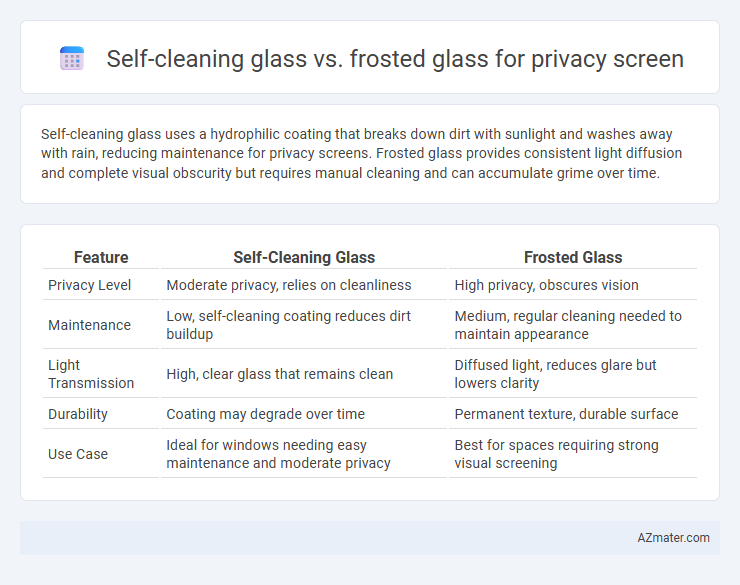Self-cleaning glass uses a hydrophilic coating that breaks down dirt with sunlight and washes away with rain, reducing maintenance for privacy screens. Frosted glass provides consistent light diffusion and complete visual obscurity but requires manual cleaning and can accumulate grime over time.
Table of Comparison
| Feature | Self-Cleaning Glass | Frosted Glass |
|---|---|---|
| Privacy Level | Moderate privacy, relies on cleanliness | High privacy, obscures vision |
| Maintenance | Low, self-cleaning coating reduces dirt buildup | Medium, regular cleaning needed to maintain appearance |
| Light Transmission | High, clear glass that remains clean | Diffused light, reduces glare but lowers clarity |
| Durability | Coating may degrade over time | Permanent texture, durable surface |
| Use Case | Ideal for windows needing easy maintenance and moderate privacy | Best for spaces requiring strong visual screening |
Introduction to Privacy Screens: Self-cleaning Glass vs Frosted Glass
Privacy screens enhance personal and professional spaces by limiting visibility while maintaining light transmission. Self-cleaning glass uses photocatalytic and hydrophilic coatings to reduce dirt build-up, preserving clarity and privacy with minimal maintenance. Frosted glass provides consistent privacy through textured or sandblasted surfaces that diffuse light and obscure vision without compromising brightness.
Understanding Self-cleaning Glass: Features and Functionality
Self-cleaning glass utilizes a photocatalytic coating, typically titanium dioxide, that breaks down organic dirt when exposed to sunlight, allowing rainwater to wash it away, maintaining clarity with minimal maintenance. This technology enhances privacy screens by reducing the need for frequent cleaning while providing a smooth, transparent surface that preserves visibility. In comparison, frosted glass obscures visibility through its textured or sandblasted surface, offering constant privacy but requiring manual cleaning due to the absence of self-cleaning properties.
Frosted Glass Explained: Characteristics and Benefits
Frosted glass features a textured surface created by sandblasting or acid etching, which diffuses light while obscuring visibility, making it ideal for privacy screens in offices and bathrooms. This type of glass offers a balance of natural light transmission and visual obstruction, preventing clear views without sacrificing brightness. Its durability and low maintenance make frosted glass a practical choice for enhancing privacy without compromising aesthetic appeal.
Privacy Performance: Self-cleaning vs Frosted Glass
Frosted glass offers superior privacy performance by diffusing light and obscuring visibility, making it ideal for settings where complete privacy is essential. Self-cleaning glass, while maintaining clear visibility through its hydrophilic coating that breaks down organic dirt, provides minimal privacy protection since it remains transparent. For applications prioritizing privacy screens, frosted glass outperforms self-cleaning glass in preventing clear views while still allowing light transmission.
Maintenance and Longevity: Which Glass Lasts Longer?
Self-cleaning glass features a special coating that breaks down organic dirt and reduces water spots, significantly lowering maintenance efforts compared to frosted glass, which often requires regular cleaning to maintain its matte appearance. The durability of frosted glass can diminish over time due to surface scratches and stains becoming more visible, whereas self-cleaning glass maintains clarity and protective properties longer due to its resistant coating. Overall, self-cleaning glass offers greater longevity with less frequent maintenance, making it a more sustainable option for privacy screens.
Aesthetic Appeal: Modern vs Classic Looks
Self-cleaning glass offers a sleek, modern aesthetic with its clear, smooth surface that enhances natural light while maintaining visibility, ideal for contemporary architectural designs. Frosted glass provides a classic, textured appearance that diffuses light softly, creating a timeless, private ambiance often favored in traditional or transitional interiors. Both options serve privacy needs effectively but differ significantly in visual impact and style preference.
Installation Process and Costs Compared
Self-cleaning glass typically involves a more complex installation process due to its specialized coatings that require careful handling and alignment to maximize self-cleaning properties, often leading to higher labor costs. Frosted glass, by contrast, offers a straightforward installation similar to standard glass panes, minimizing complexity and reducing overall installation expenses. Cost-wise, self-cleaning glass carries a premium price for both materials and installation, while frosted glass remains more budget-friendly and accessible for privacy screen applications.
Cleaning and Upkeep Requirements for Each Type
Self-cleaning glass incorporates a special coating that breaks down organic dirt and allows rainwater to wash away residues, significantly reducing the need for manual cleaning and lowering upkeep efforts. Frosted glass requires regular cleaning to maintain its privacy function, as dirt and smudges can accumulate on its textured surface, but it does not have any self-maintenance properties. Choosing self-cleaning glass can lead to long-term savings in maintenance time and cleaning products, whereas frosted glass demands consistent care to keep its appearance and privacy effectiveness intact.
Best Applications: Where Each Glass Type Excels
Self-cleaning glass excels in environments requiring low maintenance and high visibility, such as large commercial windows, skylights, and greenhouses, reducing cleaning frequency while maintaining clear views. Frosted glass is ideal for privacy-focused applications like bathroom partitions, office meeting rooms, and front doors, providing obscured visibility without sacrificing natural light. Each glass type enhances functional design by catering to specific needs: self-cleaning glass for convenience and clarity, frosted glass for privacy and light diffusion.
Making the Right Choice: Factors to Consider for Privacy Screens
Self-cleaning glass offers low-maintenance clarity by using a photocatalytic coating that breaks down dirt and grime, ideal for outdoor privacy screens exposed to the elements. Frosted glass provides consistent opacity through acid-etched or sandblasted surfaces, ensuring complete privacy without compromising light diffusion, making it suitable for indoor partitions. When making the right choice for privacy screens, consider factors such as location, maintenance requirements, light transmission, and desired aesthetic to balance functionality with privacy needs effectively.

Infographic: Self-cleaning glass vs Frosted glass for Privacy screen
 azmater.com
azmater.com